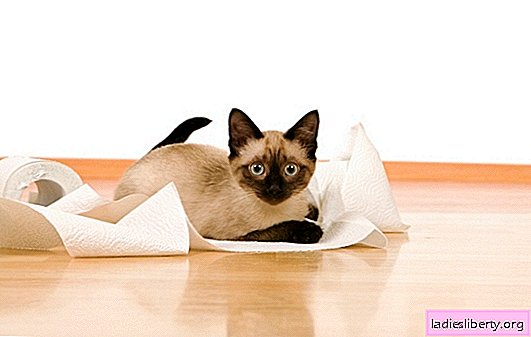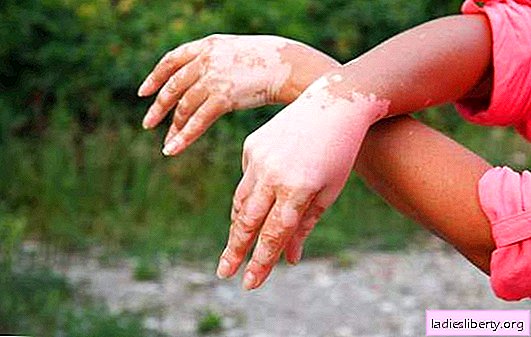
Helminthic invasion or helminthiasis. This diagnosis is very familiar to us. Despite all the countermeasures, none of us is immune from the manifestation of such a pathology. But this process is not unique to humans.
In nature, helminths actively use many representatives of the animal world as their carriers. Kittens, unfortunately, are no exception to these rules.
A small and still immature organism serves as an ideal habitat for such organisms. Since this pathological process is widespread in cats, let's take a closer look at the dangers of helminthic invasion and find out how to properly conduct deworming. And also we will analyze the causes of worms in a kitten.
The danger of helminthic invasion in a kitten
A classic helminth is a harmful organism that exists solely due to parasitism in the host organism. In the vast majority of cases, this happens by eating healthy tissues of the internal organs and lymph.
Such harmful activity can lead to an imbalance of the basic physiological systems of the carrier organism, as well as cause a number of specific deviations that directly or indirectly affect its normal development and functioning. First of all, the digestive system suffers, which very quickly leads to the depletion of the body.
In addition to direct parasitism, the vital activity of nematodes is also associated with the release of toxic substances into the environment. This process continues continuously, throughout the life of the helminth. Its result is the appearance of additional destructive processes in the tissues, as well as poisoning of the host organism and the manifestation of various allergic reactions against this background.
Important! Unlike parmavirus enteritis, feline helminthiasis can be transmitted to humans. At the same time, the risk of infection is at a very high level. For this reason, when treating a pet, the breeder must be extremely careful when dealing with a sick animal in order to minimize the risk of infection!
Symptoms of helminthic kitten infestation
In each case, the nature and strength of the manifestation of negative symptoms can vary greatly. This is primarily due to the intensity of the infection, which in the first stages may not manifest itself at all.
As the pathological process develops, the situation can worsen at an alarming rate. Your pet's body will begin to respond to actively breeding parasites. Specific signs will appear, on the basis of which the breeder will be able to accurately determine that something is wrong with his pet.
Strange behavior may indicate the presence of worms in the kitten.
Symptoms in this case can be either pronounced or relatively erased. The following is a list of the main signs of helminthic invasion in kittens.
Worms in a kitten, symptoms:
• The kitten looks lethargic and gets tired quickly.
• The presence of parasites or their larvae is observed in feces.
• The kitten has intestinal disorders (alternating diarrhea and constipation).
• The kitten dramatically loses weight.
• The kitten has a bloated and tight-to-touch stomach.
• The kitten refuses to eat.
• The kitten has bouts of vomiting.
• The hair of a kitten loses its former healthy shine, its partial loss is observed.
• The kitten looks restless and nervous.
• The kitten makes gestures, indicating an itch in the anus.
• The kitten may have partial hind legs paralysis.
• The kitten has trouble breathing, alternating with a cough.
Important! Symptoms of helminthiases are similar to other infectious diseases that are common in cats. Therefore, correct and timely diagnostic measures are of particular importance in such cases. Erroneous deworming with the help of potent pharmacological drugs can cause serious complications of another disease. This can lead to fatal consequences for the life and health of the animal. The full range of accurate diagnostic tests is possible only in specialized veterinary clinics!
If you still have questions on the topic: what to do if the kitten has worms, then this video will help you clarify them.
Therapy for helminthic invasion in kittens
Therapeutic measures begin with the correct definition of the type of parasite. The use of drugs with a wide spectrum of action is impractical, in view of their strong toxicity. An accurate determination of the type of helminthic invasion, which would allow the use of narrow-spectrum drugs, is possible only in laboratory conditions, by studying the feces of the kitten.
Worms affecting cats are divided into 4 main types:
• Tape helminths.
• Round worms.
• Hepatic worms.
• Flat flukes.
All these types differ in habitat (parasitization), as well as in shape and size. With this pathological process, it is important for the breeder to know what to do. If the worms in the kitten are observed in huge quantities, then urgent deworming is necessary. This process is a set of measures aimed at ridding the body of parasites using pharmacological agents. Medicines are prescribed by a veterinarian based on laboratory tests.
Below are the basic rules for deworming kittens.
• Anthelmintic drugs are given to kittens in the morning, before feeding.
• When dosing the drug, the weight and age of the infected animal must be taken into account.
• The use of drugs designed to eliminate helminthic infestations in humans is not allowed.
• Anthelminthic therapy of kittens should be carried out according to a two-stage scheme, with a break between stages of at least 2 weeks.
• You can start the procedure of deworming a kitten only when he reaches the age of at least 2 weeks.
As with any procedure, deworming has a number of contraindications, which should be discussed directly with the attending physician. If the kitten refuses to take anthelmintic drugs, then the breeder must use the forced feeding method. How to do it right, you can see here:
Prevention of helminthiases in kittens
The causes of worms in a kitten can be various factors. Preventive measures are designed to minimize the risk of helminth infestation in your pets.
Here is their main list.
• Protect kittens from street walks.
• Keep street shoes out of the reach of kittens.
• Exclude raw meat and raw fish from your pets ’diet.
• Do not forget to wash your hands thoroughly before contact with the kitten.
• Regularly check for fleas in the kitten’s hair and take measures to remove them.
• Clean your cat's toilet on time.
• Perform preventive deworming at least once a year.
Subject to these measures, your kittens will always be healthy and cheerful. If you still have questions on the topic: the causes of worms in kittens, then write to us through the feedback form, and we will try to answer them.











